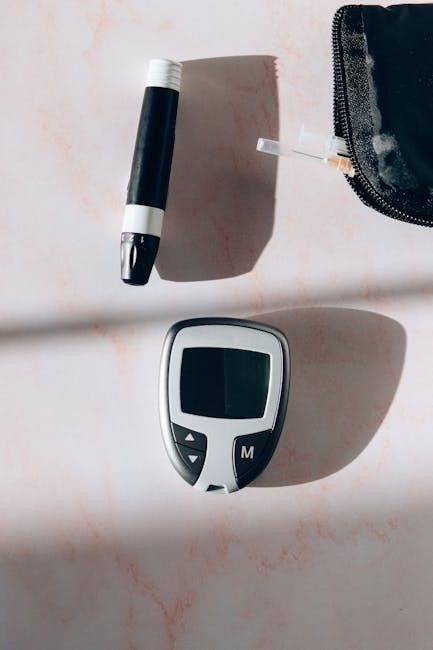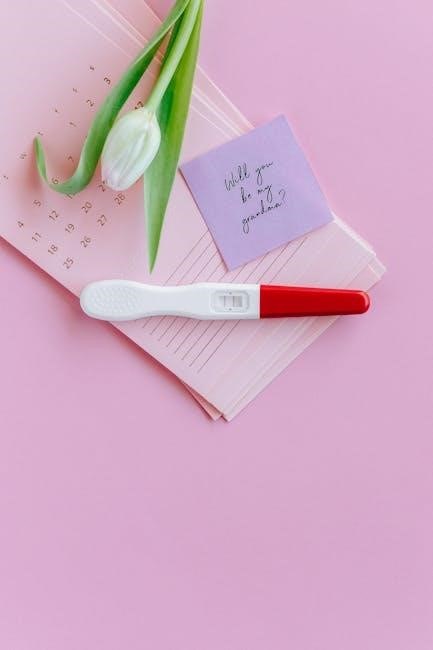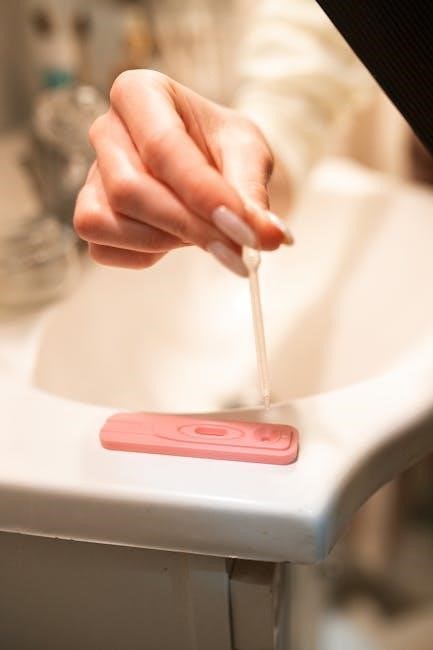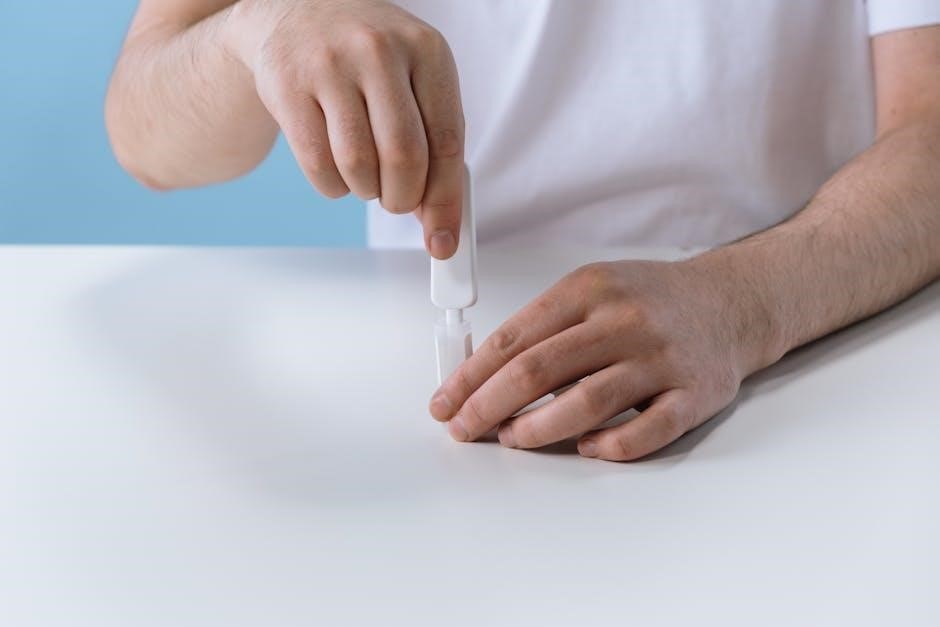Pool test kits are essential tools for ensuring water safety and clarity․ They provide accurate measurements of key chemical parameters‚ helping maintain balanced pool chemistry and prevent issues like algae growth․ With options ranging from simple test strips to comprehensive reagent kits‚ these tools empower pool owners to monitor and adjust water quality effortlessly․ Whether you’re a seasoned professional or a new pool owner‚ a reliable test kit is indispensable for keeping your pool clean‚ safe‚ and enjoyable year-round․
Why Pool Water Testing is Important
Regular pool water testing is crucial for maintaining a safe and healthy swimming environment․ Imbalanced chemical levels can lead to skin irritation‚ eye infections‚ and respiratory issues for swimmers; Additionally‚ improper pH or chlorine levels can cause algae growth‚ cloudiness‚ and damage to pool equipment․ Testing ensures clarity‚ prevents costly repairs‚ and extends the lifespan of your pool․ It also helps maintain sanitizer effectiveness‚ keeping the water clean and free from harmful contaminants․ By monitoring parameters like pH‚ chlorine‚ and alkalinity‚ you can address issues promptly‚ ensuring a safe and enjoyable swimming experience for everyone․
Overview of Pool Test Kit Types
Pool test kits come in various forms‚ each offering unique benefits․ Reagent kits use liquid chemicals to test multiple parameters‚ providing precise results․ Test strips are quick and easy‚ dipping directly into the water to detect levels of pH‚ chlorine‚ and more․ Digital testers offer high accuracy with minimal effort‚ sending results to apps for tracking․ Some kits cater to specific pool types‚ like saltwater or bromine systems․ Whether you prefer manual or digital methods‚ there’s a test kit designed to meet your pool maintenance needs‚ ensuring accurate and reliable water quality monitoring․

Understanding Pool Chemistry Parameters
Pool chemistry involves critical parameters like pH‚ chlorine‚ alkalinity‚ and calcium hardness․ These elements ensure water safety‚ clarity‚ and equipment protection‚ making regular testing essential for optimal pool conditions․
Key Parameters to Test: pH‚ Chlorine‚ Alkalinity‚ and More
Regularly testing pH‚ chlorine‚ alkalinity‚ and calcium hardness is crucial for maintaining balanced pool water․ pH levels should range between 7․2 and 7․8 to ensure swimmer comfort and sanitizer effectiveness․ Chlorine levels must be between 1 and 3 ppm for proper disinfection․ Alkalinity acts as a stabilizer‚ ideally maintained between 80 and 120 ppm to prevent pH fluctuations․ Calcium hardness should be kept between 200 and 400 ppm to protect equipment and prevent corrosion․ Additionally‚ cyanuric acid levels are important for stabilizing chlorine‚ especially in outdoor pools‚ and should be maintained between 30 and 50 ppm․ Monitoring these parameters ensures a safe and clear swimming environment‚ preventing issues like algae growth and equipment damage․ Regular testing with a reliable pool test kit helps maintain optimal water chemistry and extends the lifespan of pool equipment․ By staying informed about these key parameters‚ pool owners can make necessary adjustments promptly‚ ensuring a healthy and enjoyable swimming experience throughout the season․
Importance of Balanced Pool Chemistry for Safety and Clarity
Balanced pool chemistry is vital for ensuring swimmer safety and maintaining crystal-clear water․ Proper pH levels prevent eye irritation and skin discomfort‚ while optimal chlorine levels effectively sanitize the water․ Imbalanced chemistry can lead to cloudy water‚ algae growth‚ and equipment damage․ Additionally‚ unstable pH or alkalinity can reduce the effectiveness of disinfectants‚ compromising water safety․ Regular testing and adjustments are essential to maintain a safe and enjoyable swimming environment․ Neglecting pool chemistry can result in costly repairs and create unhealthy conditions for swimmers․ Balanced parameters ensure clarity‚ comfort‚ and longevity of your pool system․

Choosing the Right Pool Test Kit
Selecting the right pool test kit ensures accurate water chemistry measurements․ Consider your pool type‚ budget‚ and preferred method—reagent kits‚ test strips‚ or digital testers․ Choose wisely for precise results․
Types of Pool Test Kits: Reagent Kits‚ Test Strips‚ and Digital Testers
Pool test kits vary in design‚ offering options to suit different needs․ Reagent kits use chemical drops for precise measurements‚ ideal for experienced users; Test strips provide quick‚ convenient results by comparing color changes․ Digital testers offer high accuracy and ease‚ with some syncing to apps for tracking․ Each type has its benefits‚ whether you prioritize affordability‚ speed‚ or advanced features․ Choose the one that aligns with your pool maintenance routine and skill level for optimal water quality management․
Factors to Consider: Pool Type‚ Budget‚ and Ease of Use
When selecting a pool test kit‚ consider your pool type‚ budget‚ and desired ease of use․ Chlorine and bromine pools have standard testing needs‚ while saltwater pools may require additional parameters․ Budget-friendly options like basic test strips or reagent kits are ideal for simple monitoring․ Digital testers offer advanced accuracy but at a higher cost․ Ease of use varies‚ with test strips being the simplest and digital testers providing app-based convenience․ Balancing these factors ensures you find the right kit for your needs without overspending․ This helps maintain optimal water quality and safety for swimmers․

Step-by-Step Instructions for Using a Pool Test Kit
Collect a water sample‚ use test strips or reagents‚ compare results to charts‚ and adjust chemicals as needed to maintain balanced pool chemistry and safety․
How to Collect a Water Sample
Collecting a water sample correctly ensures accurate test results․ Use a clean‚ dry container to scoop water from 12-18 inches below the surface‚ avoiding the top layer․ For pools‚ collect from the deep end‚ away from skimmers and returns‚ to avoid contamination․ Fill the container to the recommended level‚ usually 1-2 inches․ If using test strips‚ dip them fully into the water for 2-3 seconds․ For reagent kits‚ fill the provided test tube to the marked line․ Avoid touching the test strip or adding too much water‚ as this can cause inaccurate readings․ Store the sample in a shaded area to prevent sunlight interference and test immediately for the best results․
How to Use Test Strips or Reagent Kits
Using test strips: Dip the strip into the water sample‚ ensuring all pads are submerged․ Hold for 2-3 seconds‚ then remove and wait 15-30 seconds for color changes․ Match the colors to the chart to determine levels․ For reagent kits‚ fill the test tube to the marked line with pool water․ Add the required number of reagent drops‚ mix gently‚ and compare the color to the provided chart․ Always follow the kit’s instructions for specific parameters like pH‚ chlorine‚ or alkalinity․ Avoid touching the test strip pads or adding excess reagent to ensure accurate results․
How to Interpret Test Results
Interpreting pool test results involves matching the color changes on test strips to the provided chart or analyzing reagent kit colors․ Compare pH‚ chlorine‚ and alkalinity levels to recommended ranges․ If pH is too high‚ add acid; if low‚ add base․ Adjust chlorine for safety and effectiveness․ Check alkalinity to stabilize pH and prevent fluctuations․ For cyanuric acid‚ ensure levels are adequate to protect chlorine from sunlight․ Refer to the kit’s guide for specific adjustments․ Record results to monitor trends and maintain balanced water chemistry for a safe and clear pool․ Regular testing ensures optimal conditions․ Use apps for digital testers to track and adjust levels effortlessly over time․

Maintaining and Storing Your Pool Test Kit
Store pool test kits in a cool‚ dry place to preserve reagent accuracy․ Replace expired or contaminated reagents promptly․ Handle test strips and chemicals carefully to avoid spills and contamination for reliable results․
Tips for Proper Storage to Ensure Accuracy
Proper storage of your pool test kit is crucial for maintaining accuracy․ Keep the kit in a cool‚ dry place away from direct sunlight and moisture․ Avoid exposing reagents to extreme temperatures‚ as this can degrade their effectiveness․ Store test strips in their original containers with lids tightly sealed to prevent contamination․ Reagents should be kept in their original bottles‚ ensuring caps are securely closed after each use․ Regularly check expiration dates and replace expired materials․ Clean and dry the kit after each use to prevent residue buildup․ Proper handling and storage ensure reliable test results and extend the kit’s lifespan․
When to Replace Reagents or Test Strips
Replace reagents or test strips when they expire or show signs of deterioration․ Check expiration dates on packaging‚ as outdated chemicals may provide inaccurate results․ If reagents change color or become cloudy‚ they should be discarded․ Test strips that fade or no longer produce clear color changes should also be replaced․ Moisture exposure can cause reagents to clump or strips to degrade‚ so monitor storage conditions․ Regularly update your kit to ensure reliable testing and maintain accurate water chemistry․ Replace supplies immediately if you notice any irregularities to keep your pool water safe and balanced․

Troubleshooting Common Testing Issues
Common testing issues include expired reagents‚ incorrect dilution‚ or contaminated samples․ Always follow kit instructions and replace expired supplies to ensure accurate results․ Regular calibration helps avoid errors․
Resolving Inaccurate or Confusing Results
Inaccurate results often stem from expired reagents‚ contamination‚ or improper testing techniques; Always check reagent expiration dates and store them in a cool‚ dry place․ Contamination can occur from dirty test tubes or improper handling․ To avoid this‚ rinse equipment thoroughly and use gloves to prevent skin oils from interfering․ If color matching is unclear‚ compare samples under natural light or consult the provided color chart․ For persistent issues‚ consider using digital testers‚ which eliminate color-matching errors and provide precise readings․ Regularly calibrate equipment and follow kit instructions carefully to ensure reliable outcomes․

Advanced Pool Testing Tips
Utilize smartphone apps for real-time monitoring and automated chemical recommendations․ Regularly track water chemistry trends to anticipate adjustments‚ ensuring optimal pool conditions consistently and efficiently․
Using Digital Pool Testers for Greater Accuracy
Digital pool testers offer unparalleled precision and convenience for monitoring water chemistry․ These advanced devices can test up to 10 parameters in minutes‚ providing instant‚ accurate results․ Many models connect to smartphone apps‚ allowing users to track chemical levels over time and receive tailored adjustment recommendations․ Features like automated sample mixing and detailed reports ensure consistency and ease of use․ While some digital testers require a subscription or additional testing disks‚ they are a worthwhile investment for frequent testing and maintaining optimal pool conditions․ They simplify complex water chemistry‚ making it easier to keep your pool safe and crystal-clear․
Tracking Water Chemistry Over Time
Regularly tracking your pool’s water chemistry is crucial for maintaining consistency and preventing imbalances․ Digital pool testers and apps allow you to monitor parameters like pH‚ chlorine‚ and alkalinity over time‚ providing a clear history of your pool’s chemical levels․ This data helps identify trends and potential issues before they escalate․ By logging test results‚ you can adjust chemicals more effectively and ensure your pool remains safe and clear․ Over time‚ this practice also helps you understand how environmental factors‚ usage‚ and seasonal changes impact your pool’s chemistry‚ enabling proactive maintenance and better decision-making․
Pool test kits are essential for maintaining safe‚ clear‚ and balanced water․ With options like digital testers and strips‚ they ensure accurate results and simplify pool care․ Invest wisely for consistent water quality and enjoyment․
Final Thoughts on Pool Test Kits and Water Maintenance
Regular pool water testing is crucial for maintaining a safe and enjoyable swimming environment․ Pool test kits provide accurate measurements of pH‚ chlorine‚ alkalinity‚ and more‚ ensuring balanced chemistry․ With options like test strips‚ reagent kits‚ and digital testers‚ pool owners can choose the best fit for their needs․ Proper use and storage of these kits ensure reliable results․ By following instructions and tracking water parameters‚ pool maintenance becomes efficient and effective‚ preventing issues like algae growth and ensuring crystal-clear water all season long․
